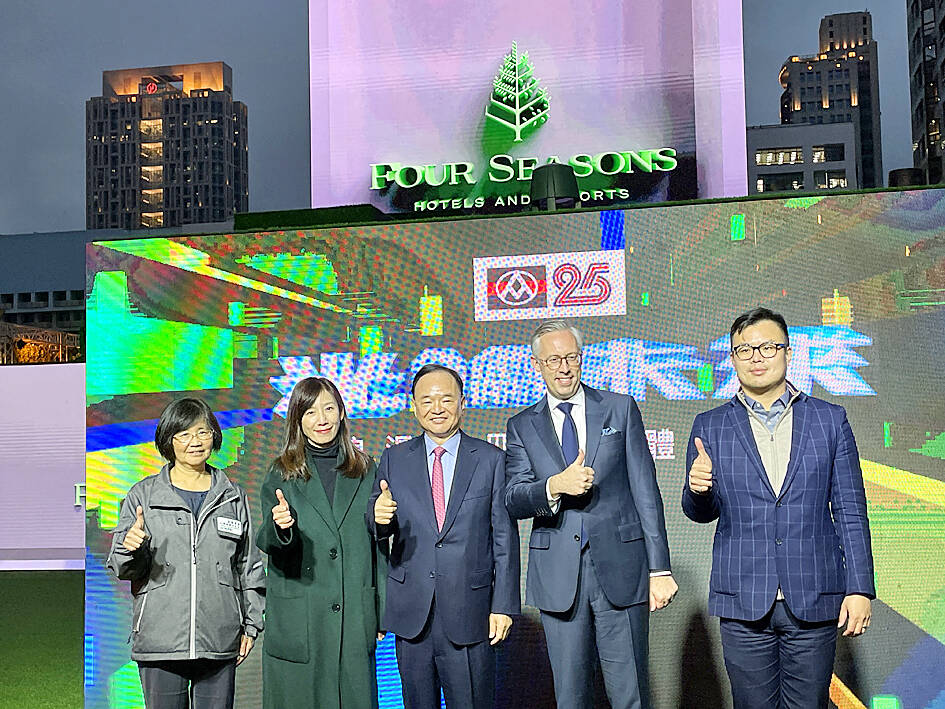International hospitality operator Four Seasons Hotels and Resorts is partnering with Taiwanese developer Yuanlih Group (元利建設) to open a new five-star hotel in central Taipei.
They announced the collaboration on Tuesday evening, saying that the Toronto-based company aims to boost its presence in Asia, while the local developer seeks to venture into the hotel business.
“Taipei has long been a target destination for Four Seasons, as we look to expand our presence in Asia’s most important cities,” Four Seasons global business development and portfolio management president Bart Carnahan said.

Photo: Amy Yang, Taipei Times
The new property, Four Seasons Hotel Taipei, would be in Xinyi District (信義), opposite Taipei 101, one of the city’s top tourist attractions, and home the Taiwan Stock Exchange, major banks and organizations, and high-end shopping and office spaces.
The location was chosen to ensure that the hotel would be convenient for business and leisure travelers alike, Carnahan said.
The hotel would be built on a 1,552 ping (5,121m2) plot and have about 260 rooms on 31 floors above ground, Yuanlih chairman Lin Ming-hsiung (林敏雄) said, adding that construction began last year and would finish in 2025.
Lin — who also heads PX Mart Co Ltd (全聯實業), the operator of PXmart (全聯福利中心), the nation’s largest supermarket chain — said he previously aimed to build an office building on the plot, but Four Seasons approached him and he changed his plan.
Lin said that despite his lack of experience in the hospitality industry, he is confident in the luxury hotel brand.
Four Seasons does not own any of its properties worldwide, but operates them on behalf of real-estate management firms and developers.
The contracts between Four Seasons and property owners typically permit it to participate in the design of the property and run it with nearly total control over every aspect of the operation.
Four Seasons Hotel Taipei would have a restaurant focused on Chinese cuisine, a destination bar, a specialty restaurant, an all-day restaurant, a pool bar and a lobby lounge, Carnahan said.
Lin said construction costs have picked up significantly in the past few years, but remain bearable.
The arrival of Four Seasons would sharpen competition in Xinyi District, where private equity fund Riant Capital Ltd (子樂投資) is to launch two luxury hotels under the Park Hyatt and Andaz brands in the yet-to-open Taipei Sky Tower.
The new hotels would have to compete with Grand Hyatt, W Hotel and Le Meridien.
Formosa International Hotels Corp (晶華集團) said it welcomed more internationally renowned hotel brands, saying they would help raise Taipei’s profile on the world stage.

MULTIFACETED: A task force has analyzed possible scenarios and created responses to assist domestic industries in dealing with US tariffs, the economics minister said The Executive Yuan is tomorrow to announce countermeasures to US President Donald Trump’s planned reciprocal tariffs, although the details of the plan would not be made public until Monday next week, Minister of Economic Affairs J.W. Kuo (郭智輝) said yesterday. The Cabinet established an economic and trade task force in November last year to deal with US trade and tariff related issues, Kuo told reporters outside the legislature in Taipei. The task force has been analyzing and evaluating all kinds of scenarios to identify suitable responses and determine how best to assist domestic industries in managing the effects of Trump’s tariffs, he

TIGHT-LIPPED: UMC said it had no merger plans at the moment, after Nikkei Asia reported that the firm and GlobalFoundries were considering restarting merger talks United Microelectronics Corp (UMC, 聯電), the world’s No. 4 contract chipmaker, yesterday launched a new US$5 billion 12-inch chip factory in Singapore as part of its latest effort to diversify its manufacturing footprint amid growing geopolitical risks. The new factory, adjacent to UMC’s existing Singapore fab in the Pasir Res Wafer Fab Park, is scheduled to enter volume production next year, utilizing mature 22-nanometer and 28-nanometer process technologies, UMC said in a statement. The company plans to invest US$5 billion during the first phase of the new fab, which would have an installed capacity of 30,000 12-inch wafers per month, it said. The

Taiwan’s official purchasing managers’ index (PMI) last month rose 0.2 percentage points to 54.2, in a second consecutive month of expansion, thanks to front-loading demand intended to avoid potential US tariff hikes, the Chung-Hua Institution for Economic Research (CIER, 中華經濟研究院) said yesterday. While short-term demand appeared robust, uncertainties rose due to US President Donald Trump’s unpredictable trade policy, CIER president Lien Hsien-ming (連賢明) told a news conference in Taipei. Taiwan’s economy this year would be characterized by high-level fluctuations and the volatility would be wilder than most expect, Lien said Demand for electronics, particularly semiconductors, continues to benefit from US technology giants’ effort

‘SWASTICAR’: Tesla CEO Elon Musk’s close association with Donald Trump has prompted opponents to brand him a ‘Nazi’ and resulted in a dramatic drop in sales Demonstrators descended on Tesla Inc dealerships across the US, and in Europe and Canada on Saturday to protest company chief Elon Musk, who has amassed extraordinary power as a top adviser to US President Donald Trump. Waving signs with messages such as “Musk is stealing our money” and “Reclaim our country,” the protests largely took place peacefully following fiery episodes of vandalism on Tesla vehicles, dealerships and other facilities in recent weeks that US officials have denounced as terrorism. Hundreds rallied on Saturday outside the Tesla dealership in Manhattan. Some blasted Musk, the world’s richest man, while others demanded the shuttering of his